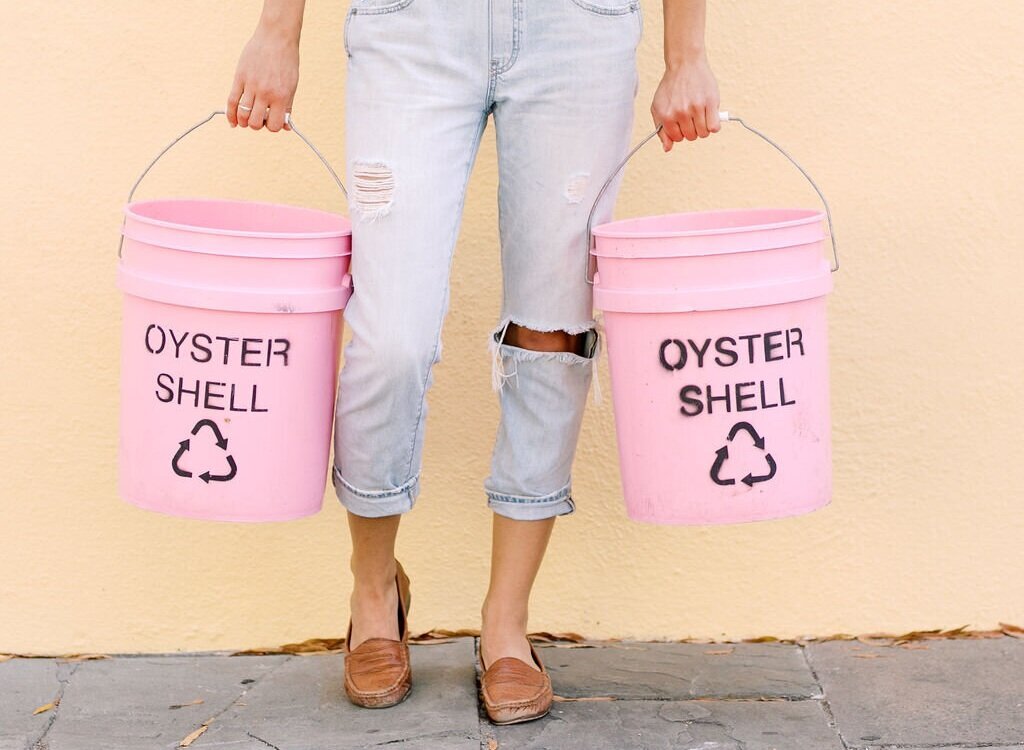
Charleston Oyster Shell Recycling Program
From day one, Grit & Grace Studio has recycled 10 oyster shells for every oyster shell product sold.
When Grit & Grace Studio founder Rachel Gordon began working with oyster shells and conceptualizing her oyster shell lifestyle collection, she researched the industry and learned there was a critical shell shortage in South Carolina. Rachel felt immediately called to this crisis and became an advocate for oyster shell recycling in Charleston, partnering with the SCDNR Oyster Recycling and Restoration Program. She implemented an ambitious recycling program immediately, integrating sustainable business practices into Grit & Grace Studio from day one.
As of December 2021, Grit & Grace Studio has recycled more than 9,105 gallons of oyster shells back to the Charleston area waters that would otherwise have gone to a landfill.
Why do we need to recycle oyster shells?
A number of reasons! Not only are oyster reefs part of the natural breakwaters that protect our shorelines from erosion, but these reefs also provide a habitat for a variety of marine species, including young oyster larvae.
During the summer, the adult oysters release millions of fertilized eggs into the water. These tiny, free-swimming oyster larvae may be carried far from their reef of origin as they develop over the next two to three weeks. At that point in their growth, the young oyster must attach to a hard substrate in our soft marsh soil, preferably another oyster shell or oyster reef, in order to survive.
If the developing oyster is unable to find a hard substrate, it will wither and die. These juvenile oysters, known as spat, require several years to reach suitable size for harvest, but they will begin to reproduce within a year.
When adult wild oysters are harvested, this vital life cycle can be disrupted if the shell is not replaced to provide habitat for the young oysters. Replenishing oyster shell is an important way to ensure the future generations of oysters.Complete the cycle by recycling!
Why are oysters so important?
Oysters are more than a seafood delicacy! These tiny ocean superheroes protect our seas and contribute to the wellness of our ecosystem in many ways, including:
Filtration: All oysters are filter feeders, and adult oysters filter up to 2.5 gallons of water per hour, improving water quality while they feed.
Habitat: Oysters grow in clusters that form reefs. These reefs provide habitat for fish, shrimp, crabs, and other marine animals, promoting a healthy ecosystem.
Erosion: Oyster reefs are natural breakwaters that protect shorelines from erosion
How Can You Help?
It is estimated that 85% of the world’s oyster reefs have already been lost.
South Carolina has a critical shortage of oyster shell, and to properly manage the state's oyster beds and maintain these important oyster habitats, citizens and businesses must continually recycle the oyster shell that is removed from our environment instead of letting it go to a landfill.
The oyster shells recycled through the Grit & Grace Studio program would otherwise have been landfill-bound. Grit & Grace Studio is proud to have expanded our operation to be an integral part of the oyster shell recycling process around the Lowcountry, bridging the gap between restaurants and proper, sanitary shell waste disposal (no small feat in the blistering Charleston heat, y’all!).
The oyster shells we recycle are quarantined for six months and returned to their natural habitat to replenish existing reefs and allow oyster spat a safe place to grow, completing the cycle of life!
When you support Grit & Grace Studio by purchasing our one-of-a-kind oyster shell pieces, you support our mission to recycle oyster shells and rebuild our beautiful marshes and seas. We’re all stronger together.
The South Carolina Department of Natural Resources (SCDNR) has a statewide oyster shell recycling program. You can drop off your oyster shells at one of several shell recycling centers located along the South Carolina coast, or a pickup service may be available for large quantities of shell.
